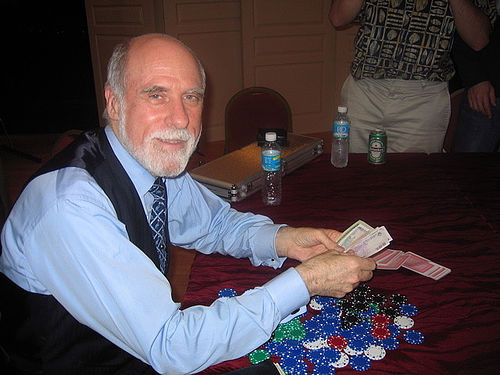Google Chief Internet Evangelist Vint Cerf, Father of ‘Net and Chair of ICANN
This week Google hired Vinton Cerf, the “father of the Internet” and the Chairman of ICANN (Internet Corporation for Assigned Names and Numbers), to serve as their Chief Internet Evangelist. While working at the US Department of Defense Advanced Research Projects Agency (DARPA) Vint Cerf played an important role in the development of Internet. At DARPA he co-designed the TCP/IP protocol, on which the Internet runs.
Google CEO Eric Schmidt said “Cerf is clearly one of the great technology leaders of our time”. Besides the Internet here on Earth, Vint is also working with NASA to develop Interplanetary Protocol which is planned to be “a new standard to communicate from planet to planet, using radio/laser communications that are highly tolerant to signal degradation.” Google taking this Google Moon stuff a little too seriously?
 Why did Vint make the switch from MCI to Google? Is this just a PR stunt hiring? What exactly is a “Chief Internet Evagelist”? Is Cerf now the Pat Robertson of Search Enignes? Vint explained what attracted him to Google; “Google has already made tremendous strides in making access to information on the web a reality for users across the globe, but we’re still in the Internet’s early innings,” he said. “This medium will enjoy wider-spread use than television, radio or phones, and will ultimately expand beyond planet Earth. Google has always believed in doing things differently, and I believe that places us in a unique position to help bring even the wildest Internet visions into reality.”
Why did Vint make the switch from MCI to Google? Is this just a PR stunt hiring? What exactly is a “Chief Internet Evagelist”? Is Cerf now the Pat Robertson of Search Enignes? Vint explained what attracted him to Google; “Google has already made tremendous strides in making access to information on the web a reality for users across the globe, but we’re still in the Internet’s early innings,” he said. “This medium will enjoy wider-spread use than television, radio or phones, and will ultimately expand beyond planet Earth. Google has always believed in doing things differently, and I believe that places us in a unique position to help bring even the wildest Internet visions into reality.”
Vint also posted on the Google Blog how much he appreciates the new position at Google and working with ‘the boys’ : “What I really like about Eric, Larry, Sergey and the whole Google family is its collective and eminent practicality and seemingly boundless creativity. In fact, my recent interactions with many of Google’s senior staff have simply underscored my admiration for the extraordinary talent at Google that has been assembled in a short amount of time. Google has come so far since the early days!
Among other things, I am committed to the vision of Google’s criticality to the daily lives of hundreds of millions of people. The public Internet and the growing cadre of corporate virtual private networks are already enablers of Google applications. As information pours into the Internet from all sides, Google tools will become, if they are not already, indispensable.”
Would you like some background info on Cerf and his credentials (besides being the Father of the Internet)? Wikipedia lists the following info on Cerf: Cerf received a Bachelor of Science degree in Mathematics from Stanford in 1965. After graduation, he went to work for IBM, but soon decided that he wanted to learn more about computers. In 1967, he returned to school, enrolling in UCLA’s computer science program, where he was a student under Leonard Kleinrock. He received Master of Science and Ph.D. degrees in 1970 and 1972.
While at UCLA, he worked on the ARPANET, the earliest packet switched computer network. During this period (as well as later), he was the author of several RFCs. He continued working on computer networks when he became a professor at Stanford University in 1972. Shortly thereafter, in 1973, Bob Kahn (whom Cerf already knew, since Kahn had been in charge of the ARPANET project at its prime contractor, Bolt, Beranek and Newman) and Cerf started thinking about how to connect together several different packet switching networks, into what we now call an internetwork. Their 1974 paper, A Protocol for Packet Network Intercommunication is now recognized as the fundamental document in this (then-new) field.
Soon afterwards, in 1976, he was asked to move to the United States Department of Defense’s Advanced Research Projects Agency (DARPA), to run a research and development program in this area. During his tenure, from 1976 to 1982, he played a key role in leading the development of the TCP/IP protocols and the Internet. After that, as vice president of MCI Digital Information Services from 1982 to 1986, he led the engineering of MCI Mail, the first commercial email service to be connected to the Internet.




![AI Overviews: We Reverse-Engineered Them So You Don't Have To [+ What You Need To Do Next]](https://www.searchenginejournal.com/wp-content/uploads/2025/04/sidebar1x-455.png)